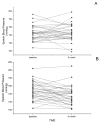Dietary Flaxseed as a Strategy for Improving Human Health - PubMed (original) (raw)
Review
Dietary Flaxseed as a Strategy for Improving Human Health
Mihir Parikh et al. Nutrients. 2019.
Abstract
Flaxseed is a rich source of the omega-3 fatty acid, alpha linolenic acid, the lignan secoisolariciresinol diglucoside and fiber. These compounds provide bioactivity of value to the health of animals and humans through their anti-inflammatory action, anti-oxidative capacity and lipid modulating properties. The characteristics of ingesting flaxseed or its bioactive components are discussed in this article. The benefits of administering flaxseed or the individual bioactive components on health and disease are also discussed in this review. Specifically, the current evidence on the benefits or limitations of dietary flaxseed in a variety of cardiovascular diseases, cancer, gastro-intestinal health and brain development and function, as well as hormonal status in menopausal women, are comprehensive topics for discussion.
Keywords: cancer; cardiovascular; diabetes; flaxseed; functional food; menopause; microbiome; nutraceutical.
Conflict of interest statement
The authors declare no conflict of interest. The funders had no role in the design of the study; in the collection, analyses, or interpretation of data; in the writing of the manuscript, or in the decision to publish the results.
Figures
Figure 1
The effect of dietary flaxseed on the various types of cardiovascular disease. Arrows going up denote an increase in a specific parameter whereas arrows going down denote a decrease in a specific parameter.
Figure 2
Individual values of systolic blood pressure at baseline or after 6 months of dietary supplementation with a placebo (A) or 30 g of milled flaxseed per day (B). Baseline systolic blood pressures in the placebo group were 143.5 ± 2.88 at baseline and 144.8 ± 3.33 after 6 months (n = 36). Baseline systolic blood pressures in the flax group were 146.6 ± 3.37 at baseline and 136.5 ± 3.53 after 6 months (n = 41). Results are obtained from Rodriguez-Leyva et al, 2013 [5].
Figure 3
The effect of dietary flaxseed on the gastrointestinal health.
Similar articles
- Discriminatory and cooperative effects within the mouse gut microbiota in response to flaxseed and its oil and lignan components.
Taibi A, Ku M, Lin Z, Gargari G, Kubant A, Lepp D, Power KA, Guglielmetti S, Thompson LU, Comelli EM. Taibi A, et al. J Nutr Biochem. 2021 Dec;98:108818. doi: 10.1016/j.jnutbio.2021.108818. Epub 2021 Jul 14. J Nutr Biochem. 2021. PMID: 34271098 - Performance and egg quality of laying hens fed flaxseed: highlights on n-3 fatty acids, cholesterol, lignans and isoflavones.
Mattioli S, Ruggeri S, Sebastiani B, Brecchia G, Dal Bosco A, Cartoni Mancinelli A, Castellini C. Mattioli S, et al. Animal. 2017 Apr;11(4):705-712. doi: 10.1017/S175173111600207X. Epub 2016 Nov 7. Animal. 2017. PMID: 27819218 - Health effects with consumption of the flax lignan secoisolariciresinol diglucoside.
Adolphe JL, Whiting SJ, Juurlink BH, Thorpe LU, Alcorn J. Adolphe JL, et al. Br J Nutr. 2010 Apr;103(7):929-38. doi: 10.1017/S0007114509992753. Epub 2009 Dec 15. Br J Nutr. 2010. PMID: 20003621 Review. - Dietary flaxseed protects against ventricular arrhythmias and left ventricular dilation after a myocardial infarction.
Parikh M, Raj P, Austria JA, Yu L, Garg B, Netticadan T, Pierce GN. Parikh M, et al. J Nutr Biochem. 2019 Sep;71:63-71. doi: 10.1016/j.jnutbio.2019.06.004. Epub 2019 Jun 21. J Nutr Biochem. 2019. PMID: 31284167 - [Nutritional value and functional properties of flaxseed].
Martinchik AN, Baturin AK, Zubtsov VV, Molofeev VIu. Martinchik AN, et al. Vopr Pitan. 2012;81(3):4-10. Vopr Pitan. 2012. PMID: 22888664 Review. Russian.
Cited by
- Bioinformatics and Chemoinformatics Analysis Explored the Role of Linum usitatissimum in Diabetic Heart Conditions: Experimental Analysis in H9c2 Rat Embryonic Cardiomyocytes Cell Lines.
Safavi K, Hajibabaie F, Abedpoor N. Safavi K, et al. J Med Signals Sens. 2024 Sep 2;14:27. doi: 10.4103/jmss.jmss_4_24. eCollection 2024. J Med Signals Sens. 2024. PMID: 39380770 Free PMC article. - Molecular Advances to Combat Different Biotic and Abiotic Stresses in Linseed (Linum usitatissimum L.): A Comprehensive Review.
Paliwal S, Tripathi MK, Tiwari S, Tripathi N, Payasi DK, Tiwari PN, Singh K, Yadav RK, Asati R, Chauhan S. Paliwal S, et al. Genes (Basel). 2023 Jul 17;14(7):1461. doi: 10.3390/genes14071461. Genes (Basel). 2023. PMID: 37510365 Free PMC article. Review. - Targeting Metabolic Consequences of Insulin Resistance in Polycystic Ovary Syndrome by D-chiro-inositol and Emerging Nutraceuticals: A Focused Review.
Davinelli S, Nicolosi D, Di Cesare C, Scapagnini G, Di Marco R. Davinelli S, et al. J Clin Med. 2020 Apr 2;9(4):987. doi: 10.3390/jcm9040987. J Clin Med. 2020. PMID: 32252239 Free PMC article. Review. - Genome Sequencing of Fiber Flax Cultivar Atlant Using Oxford Nanopore and Illumina Platforms.
Dmitriev AA, Pushkova EN, Novakovskiy RO, Beniaminov AD, Rozhmina TA, Zhuchenko AA, Bolsheva NL, Muravenko OV, Povkhova LV, Dvorianinova EM, Kezimana P, Snezhkina AV, Kudryavtseva AV, Krasnov GS, Melnikova NV. Dmitriev AA, et al. Front Genet. 2021 Jan 14;11:590282. doi: 10.3389/fgene.2020.590282. eCollection 2020. Front Genet. 2021. PMID: 33519894 Free PMC article. No abstract available. - Flaxseed Oil Alleviates Trimethyltin-Induced Cell Injury and Inhibits the Pro-Inflammatory Activation of Astrocytes in the Hippocampus of Female Rats.
Mitrović N, Adžić Bukvić M, Zarić Kontić M, Dragić M, Petrović S, Paunović M, Vučić V, Grković I. Mitrović N, et al. Cells. 2024 Jul 11;13(14):1184. doi: 10.3390/cells13141184. Cells. 2024. PMID: 39056766 Free PMC article.
References
- Brown L., Caligiuri S.P.B., Brown D., Pierce G.N. Clinical trials using functional foods provide unique challenges. J. Funct. Foods. 2018;45:233–238. doi: 10.1016/j.jff.2018.01.024. - DOI
- Ramicharitrar A., Badrie N., Mattfeldt-Beman M., Matsuo H., Ridley C. Consumer acceptability of muffins with flaxseed (Linum usitatissimum) J. Food Sci. 2005;70:5504–5507.
- Rodriguez-Leyva D., Weighell W., Edel A.L., La Vallee R., Dibrov E., Pinneker R., Maddaford T.G., Ramjiawan B., Aliani M., Guzman R., et al. Potent anti-hypertensive action of dietary flaxseed in hypertensive patients. Hypertension. 2013;62:1081–1089. doi: 10.1161/HYPERTENSIONAHA.113.02094. - DOI - PubMed
Publication types
MeSH terms
Substances
Grants and funding
- Foundation/Canadian Institutes of Health Research/Canada
- None/This work was supported by CIHR, Western Grain Research Foundation, Saskflax, ARDI and St Boniface Hospital Foundation.
LinkOut - more resources
Full Text Sources
Other Literature Sources
Medical


